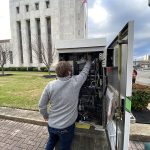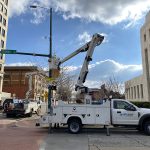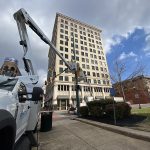 Chattanooga, TN. — The University of Tennessee-Chattanooga’s Center for Urban Informatics and Progress (CUIP), with the Chattanooga Department of Transportation, are partnering with Seoul Robotics and Ouster to make Chattanooga safer for pedestrians utilizing light detection and ranging (Lidar). Ouster’s lidar sensors and Seoul Robotics’ perception software, SENSR™, which uses deep learning technologies, would help CUIP and CDOT understand pedestrian patterns and risk factors to be mitigated.
Chattanooga, TN. — The University of Tennessee-Chattanooga’s Center for Urban Informatics and Progress (CUIP), with the Chattanooga Department of Transportation, are partnering with Seoul Robotics and Ouster to make Chattanooga safer for pedestrians utilizing light detection and ranging (Lidar). Ouster’s lidar sensors and Seoul Robotics’ perception software, SENSR™, which uses deep learning technologies, would help CUIP and CDOT understand pedestrian patterns and risk factors to be mitigated.
The lidar systems will work in conjunction with the existing MLK Smart Corridor sensors to create a more robust picture of how pedestrians and vehicles interact. Lidar sensors and perception software create extremely accurate, 3D representations of the physical environment through the identification and classification of objects, giving researchers the data they need to understand traffic and pedestrian patterns that could be dangerous for citizens. In 2018, Hamilton County had 100 pedestrian injuries and 10 pedestrian fatalities.
“We continue to find ways to work with CUIP and industry partners to further our goal of a safer, smarter Chattanooga,” Chattanooga Smart Cities Director, Kevin Comstock, said. “We know that technology, data, and collaboration can help us reduce the number of pedestrian injuries and fatalities.”
The new lidar sensors will be located in two downtown Chattanooga intersections: Martin Luther King Jr. Blvd and Market St., and Martin Luther King Jr. Blvd and Georgia Ave. These locations were selected for their close proximity to city parks and event spaces and their subsequent high volume of pedestrian activity.
“Collaboration is critical within the smart cities community. All of our work is focused on a common good, which leads to a constant flow of progress and innovation to research and technologies.” CUIP Director, Mina Sartipi, noted. “This specific collaboration will give us the ability to make our city much safer for pedestrians.”
The solution offered by Seoul Robotics and Ouster Lidar is able to detect, track and predict the movement of pedestrians and vehicles, identifying potential incidents such as accidents and wrong-way driving as well as better understanding traffic flow and suggesting reroutes. The lidar-based solution will augment existing camera infrastructure to enhance the accuracy and detail of safety data while preserving the privacy of pedestrians.
“Lidar and other 3D data solutions have the potential to make cities safer for both pedestrians and drivers, but for too long the technology has been inaccessible due to cost and the need for affordable, sensor agnostic software. Our technology is changing that,“ said HanBin Lee, co-founder and CEO of Seoul Robotics. “This installation with the City of Chattanooga and CUIP represents the future of smart cities, and will be instrumental in showcasing to other cities around the world how insights from 3D data can fuel a more efficient and safer society.”
“Lidar has great potential to both reduce accidents and increase efficiency by powering smart city infrastructure. CUIP and the City of Chattanooga are setting a leading example for the country in how to unlock this potential,” said Barrs Lang, General Manager of Americas at Ouster. He added, “This project is just the beginning, and we’re looking forward to working closely together to build a safer, smarter Chattanooga.”
Installation of Lidar units on the MLK Smart Corridor
###
The Center for Urban Informatics and Progress is a smart city research center at the University of Tennessee at Chattanooga. CUIP is committed to applied smart city research that betters the lives of citizens every day. For more on the work we’re doing and our mission, visit www.utc.edu/cuip.
Seoul Robotics is a 3D computer vision company building a perception platform that uses AI and machine learning to power the future of mobility. Founded in 2017, Seoul Robotics has partnered with OEMs, system integrators, and government agencies around the world to diversify the use of 3D data. The company has developed its own proprietary software, which is compatible with nearly all LiDAR and 3D data sensors, to increase accuracy, efficiency and ensure safety across a range of industries and applications. Seoul Robotics has offices in Seoul, Silicon Valley, Munich, and Detroit and is backed by leading global financial institutions. For more information, visit http://www.seoulrobotics.org/.
Ouster invented its digital lidar in 2015 and is a leading manufacturer of high-resolution digital lidar sensors used throughout the industrial automation, smart infrastructure, robotics, and automotive industries. Ouster’s sensors are reliable, compact, affordable, and highly customizable, laying the foundation for digital lidar ubiquity. Hundreds of customers have already incorporated Ouster lidar sensors in current products or those in development for imminent commercial release. Ouster has previously announced a merger agreement with Colonnade Acquisition Corp (NYSE: CLA), a special purpose acquisition company (SPAC), that would result in Ouster becoming a publicly listed company. For more information, please visit ouster.com, or connect with us on Twitter or LinkedIn.



Leave a Reply